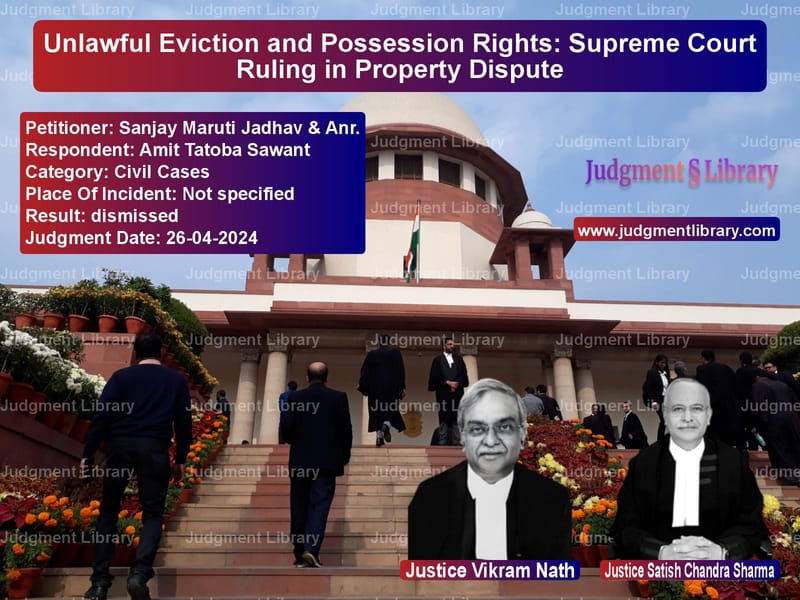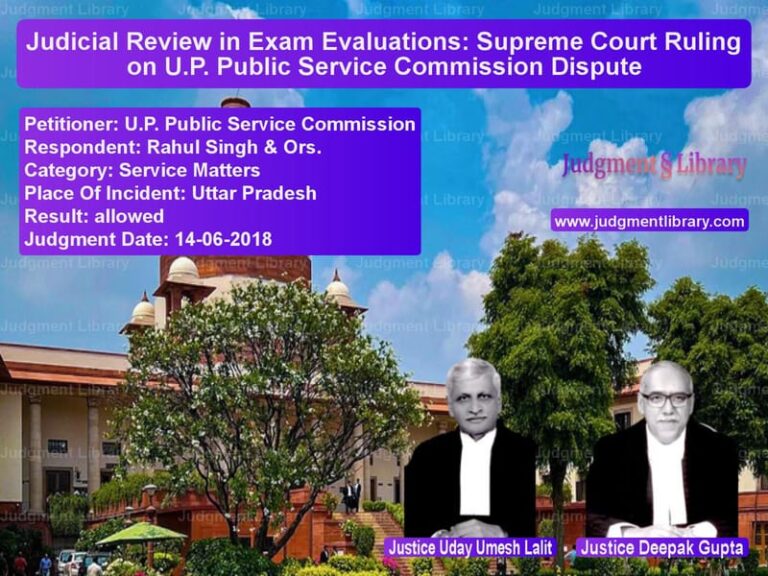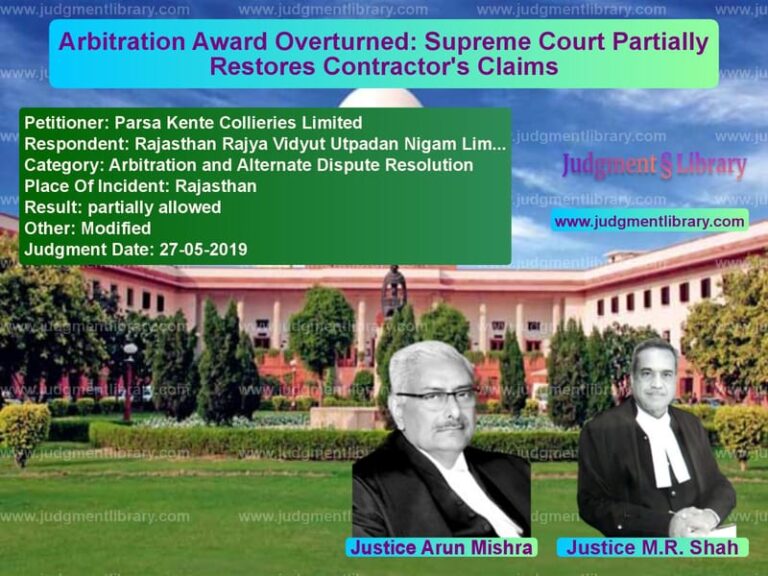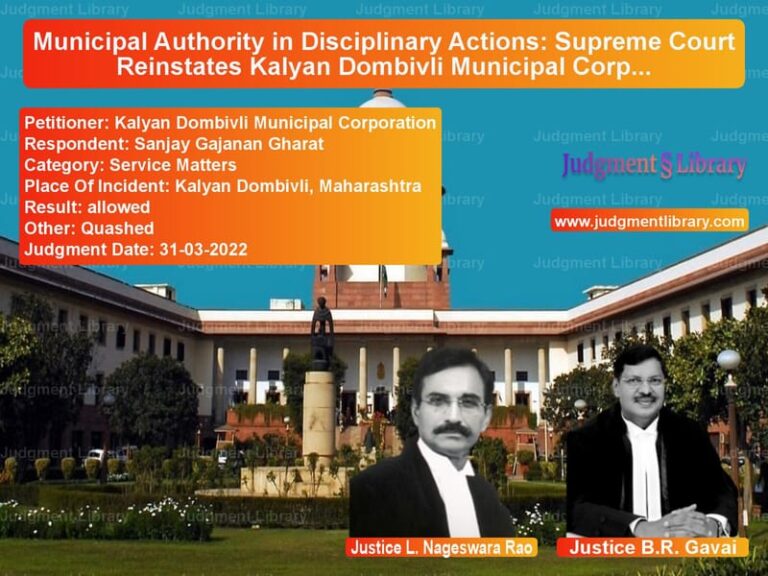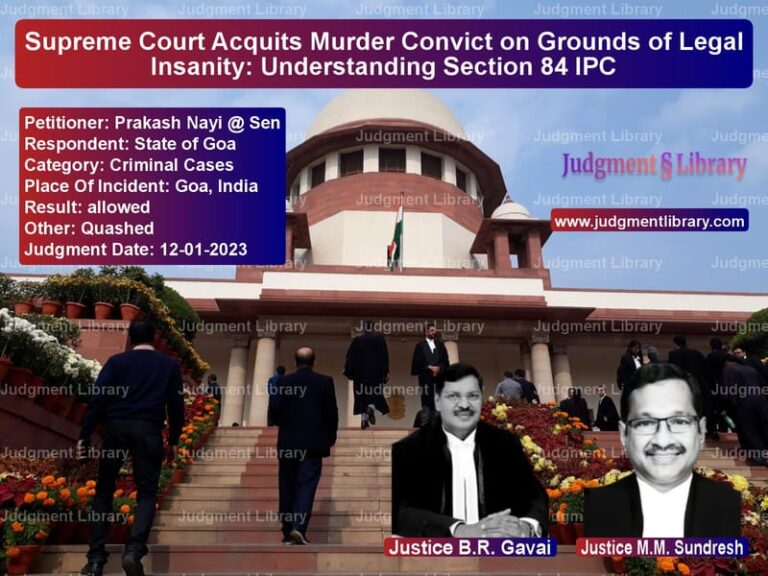Unlawful Eviction and Possession Rights: Supreme Court Ruling in Property Dispute
The Supreme Court of India has recently delivered a crucial judgment in the case of Sanjay Maruti Jadhav & Anr. vs. Amit Tatoba Sawant. This case deals with the issue of unlawful eviction and possession rights under the Specific Relief Act, 1963. The matter revolves around a dispute where the appellants, being property owners, were accused of forcibly evicting the respondent, who was in possession of the property under a leave and license agreement.
Possession rights in property disputes have long been a contentious issue in India. The law protects the rights of a person in possession, even if they are not the owner, as long as their possession is legal. This case serves as a significant reminder of these rights and the legal procedures that must be followed before evicting an occupant.
Background of the Case
The appellants in this case, Sanjay Maruti Jadhav and another, were the owners of the property in question. The respondent, Amit Tatoba Sawant, was in possession of the property under a leave and license agreement. However, the appellants allegedly evicted the respondent illegally, without following due process, and by the use of force.
Within six months of being forcibly dispossessed, the respondent initiated legal proceedings by filing a suit under Section 6 of the Specific Relief Act, 1963. This section provides that a person cannot be dispossessed of a property without due process of law, regardless of whether they have ownership rights.
Legal Issues in the Case
The primary legal questions before the courts were:
- Whether the respondent was unlawfully dispossessed from the property?
- Whether the suit under Section 6 of the Specific Relief Act, 1963, was maintainable?
- Whether the possession receipt presented by the appellants was sufficient to establish voluntary handover?
- Whether the findings of the lower courts were legally valid?
Arguments by the Appellants
The appellants (Sanjay Maruti Jadhav & Anr.) contended:
- The respondent had voluntarily vacated the property.
- A possession receipt was available as evidence of voluntary surrender.
- The suit filed under Section 6 was not maintainable.
- The respondent was not legally entitled to regain possession since they were not the owner of the property.
- The Trial Court erred in disregarding the possession receipt.
Arguments by the Respondent
The respondent (Amit Tatoba Sawant) argued:
- The eviction was illegal, unauthorized, and forceful.
- The possession receipt was unreliable and did not prove voluntary handover.
- Under Section 6 of the Specific Relief Act, a person cannot be dispossessed without due process.
- Since he was forcibly removed, he was entitled to regain possession.
- The appellants had acted unlawfully and misused their ownership rights.
Findings of the Trial Court
The Trial Court ruled in favor of the respondent, rejecting the appellants’ claim that the respondent had voluntarily vacated the premises. The court held that the possession receipt presented by the appellants was not conclusive proof of voluntary surrender.
The court further stated that under Section 6 of the Specific Relief Act, 1963, even the owner of a property cannot forcibly dispossess a person in possession. The only legal method to reclaim possession is through proper judicial process.
High Court’s Decision
The appellants then moved to the High Court in revision. The High Court upheld the findings of the Trial Court and dismissed the appeal. The High Court observed:
“The suit under Section 6 of the Specific Relief Act is maintainable, and the respondent was wrongfully dispossessed.”
The High Court concurred with the lower court’s assessment that the possession receipt was insufficient to prove voluntary surrender.
Supreme Court’s Ruling
The matter was then taken to the Supreme Court, where Justices Vikram Nath and Satish Chandra Sharma presided over the appeal.
The Supreme Court reviewed the case and made the following observations:
“Such concurrent findings, based upon the evidence on record and also being findings of fact, we do not find any merit in this appeal. The appeal is accordingly dismissed.”
With this, the Supreme Court dismissed the appeal, reaffirming the lower courts’ decisions.
Implications of the Judgment
This judgment holds significant importance in property law, particularly regarding unlawful evictions and possession rights. The key takeaways from this case include:
- A property owner cannot forcibly dispossess a tenant, licensee, or occupant without following the proper legal process.
- Section 6 of the Specific Relief Act, 1963, ensures that no person is illegally deprived of possession.
- Even if the occupant does not have ownership rights, they have legal protection against forced eviction.
- A possession receipt is not always conclusive proof of voluntary surrender.
- The courts will uphold possession rights against illegal actions by property owners.
Conclusion
The Supreme Court’s ruling in this case reinforces the legal protection given to individuals against unlawful evictions. Property owners must adhere to legal procedures and cannot take the law into their own hands.
The dismissal of the appeal confirms that the respondent had a legitimate claim to possession and was wrongfully evicted. It serves as a strong precedent in property disputes, emphasizing that possession rights are safeguarded under the law.
Petitioner Name: Sanjay Maruti Jadhav & Anr..Respondent Name: Amit Tatoba Sawant.Judgment By: Justice Vikram Nath, Justice Satish Chandra Sharma.Place Of Incident: Not specified.Judgment Date: 26-04-2024.
Don’t miss out on the full details! Download the complete judgment in PDF format below and gain valuable insights instantly!
Download Judgment: sanjay-maruti-jadhav-vs-amit-tatoba-sawant-supreme-court-of-india-judgment-dated-26-04-2024.pdf
Directly Download Judgment: Directly download this Judgment
See all petitions in Property Disputes
See all petitions in Specific Performance
See all petitions in Damages and Compensation
See all petitions in Judgment by Vikram Nath
See all petitions in Judgment by Satish Chandra Sharma
See all petitions in dismissed
See all petitions in supreme court of India judgments April 2024
See all petitions in 2024 judgments
See all posts in Civil Cases Category
See all allowed petitions in Civil Cases Category
See all Dismissed petitions in Civil Cases Category
See all partially allowed petitions in Civil Cases Category

